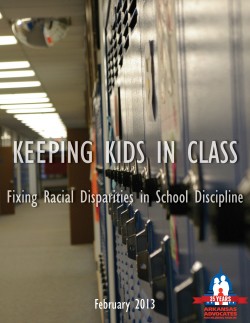
Black students in Arkansas schools are more likely to be suspended and receive corporal punishment than their white counterparts, according to a new report from Arkansas Advocates for Children and Families (AACF). In 2012 black students were given out-of-school suspension more than five times as often as white students, in-school-suspension almost three times as often, and corporal punishment almost twice as often.
Arkansas ranks 15th in the nation in the use of out-of-school suspension for all students, and 13th in the gap between black and white students in out-of-school suspensions. When students are not in school, they miss out on educational opportunities. School disciplinary policies that disproportionately keep students of color out of school reduce their opportunities to learn and increase gaps in educational achievement. According to the report, “Keeping Kids in Class: Fixing Racial Disparities in School Discipline,” Arkansas schools rely far too often on disciplinary approaches that keep too many of our students out of school, thus limiting their opportunity to learn.
Rich Huddleston, executive director of AACF, says the study’s findings are worrisome.
“Of course we don’t want to see minority students being punished more often than their white peers,” Huddleston says. “There’s another issue here and that’s the use of out-of-school suspension, period. When students aren’t in school, there’s no way they can learn. We have to find better solutions to these disciplinary issues and make sure all kids have an equal opportunity to learn.”
According to the report, some districts that are similar in terms of their size, income, and percentage of minority students have very different rates of discipline disparity. This raises serious questions about whether the disciplinary practices in some districts unfairly treat minority students. It also casts doubt on any assumption that different suspension rates between groups merely reflect differences in their behavior, which is consistent with findings in other studies.
Jerri Derlikowski, director of education policy and finance at AACF and the report’s author, says there are steps Arkansas should take to reduce these disparities and move beyond out-of-school suspension as a method of disciplining students.
“The good news is there are plenty of steps we can take,” Derlikowski says. “First of all out-of-school suspension should be used only as a last resort. Instead of sending kids home we should offer rehabilitative services in their schools. We need to make sure we adequately fund behavioral and mental health services in school, and replace many zero-tolerance policies with reasoned and appropriate disciplinary measures that keep kids in the classroom. We should also try to move away from abusive discipline techniques like corporal punishment.”
Why is this an important issue? According to the National Opportunity to Learn Campaign, suspensions and expulsions can lead to lower graduation rates. Students with three or more suspensions by their sophomore year are also five times more likely to drop out than other students.
